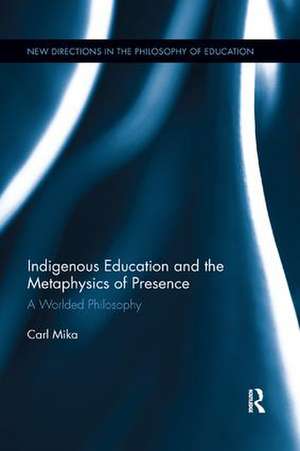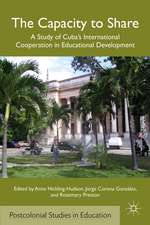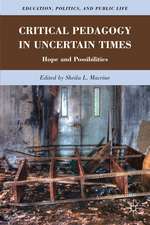Indigenous Education and the Metaphysics of Presence: A Worlded Philosophy: New Directions in the Philosophy of Education
Autor Carl Mikaen Limba Engleză Paperback – 19 dec 2018
Drawing on both Maori and Western philosophies, this book demonstrates how the metaphysics of presence is both related and opposed to the indigenous notion of worldedness. Mika explains that presence seeks to fragment things in the world, underpins how indigenous peoples can represent things, and prevents indigenous students, critics, and scholars from reflecting on philosophical colonisation. However, the metaphysics of presence, from an indigenous perspective, is constituted by all other things in the world, and Mika argues that the indigenous student and critic can re-emphasise worldedness and destabilise presence through creative responses, humour, and speculative thinking. This book concludes by positioning well-being within education, because education comprises acts of worldedness and presence.
This book will be of key interest to indigenous as well as non-indigenous academics, researchers and postgraduate students in the fields of philosophy of education, indigenous and Western philosophy, political strategy and post-colonial studies. It will also be relevant for those who are interested in philosophies of language, ontology, metaphysics and knowledge.
| Toate formatele și edițiile | Preț | Express |
|---|---|---|
| Paperback (1) | 309.38 lei 3-5 săpt. | +15.24 lei 6-10 zile |
| Taylor & Francis – 19 dec 2018 | 309.38 lei 3-5 săpt. | +15.24 lei 6-10 zile |
| Hardback (1) | 1108.24 lei 6-8 săpt. | |
| Taylor & Francis – 24 feb 2017 | 1108.24 lei 6-8 săpt. |
Din seria New Directions in the Philosophy of Education
-
 Preț: 335.96 lei
Preț: 335.96 lei -
 Preț: 272.20 lei
Preț: 272.20 lei -
 Preț: 309.04 lei
Preț: 309.04 lei -
 Preț: 334.98 lei
Preț: 334.98 lei -
 Preț: 383.06 lei
Preț: 383.06 lei -
 Preț: 422.59 lei
Preț: 422.59 lei - 17%
 Preț: 253.67 lei
Preț: 253.67 lei - 18%
 Preț: 1002.80 lei
Preț: 1002.80 lei - 18%
 Preț: 1054.75 lei
Preț: 1054.75 lei -
 Preț: 437.71 lei
Preț: 437.71 lei -
 Preț: 400.77 lei
Preț: 400.77 lei -
 Preț: 395.00 lei
Preț: 395.00 lei -
 Preț: 367.46 lei
Preț: 367.46 lei -
 Preț: 448.12 lei
Preț: 448.12 lei - 18%
 Preț: 999.02 lei
Preț: 999.02 lei - 18%
 Preț: 1000.27 lei
Preț: 1000.27 lei - 20%
 Preț: 259.72 lei
Preț: 259.72 lei -
 Preț: 401.86 lei
Preț: 401.86 lei -
 Preț: 469.07 lei
Preț: 469.07 lei -
 Preț: 402.66 lei
Preț: 402.66 lei -
 Preț: 395.00 lei
Preț: 395.00 lei - 17%
 Preț: 259.98 lei
Preț: 259.98 lei - 26%
 Preț: 820.71 lei
Preț: 820.71 lei - 18%
 Preț: 1161.80 lei
Preț: 1161.80 lei - 18%
 Preț: 998.59 lei
Preț: 998.59 lei -
 Preț: 471.80 lei
Preț: 471.80 lei - 18%
 Preț: 1000.27 lei
Preț: 1000.27 lei - 18%
 Preț: 1218.12 lei
Preț: 1218.12 lei -
 Preț: 478.16 lei
Preț: 478.16 lei -
 Preț: 489.00 lei
Preț: 489.00 lei
Preț: 309.38 lei
Nou
Puncte Express: 464
Preț estimativ în valută:
59.21€ • 64.29$ • 49.73£
59.21€ • 64.29$ • 49.73£
Carte disponibilă
Livrare economică 02-16 aprilie
Livrare express 18-22 martie pentru 25.23 lei
Preluare comenzi: 021 569.72.76
Specificații
ISBN-13: 9781138353756
ISBN-10: 1138353752
Pagini: 176
Dimensiuni: 156 x 234 x 10 mm
Greutate: 0.26 kg
Ediția:1
Editura: Taylor & Francis
Colecția Routledge
Seria New Directions in the Philosophy of Education
Locul publicării:Oxford, United Kingdom
ISBN-10: 1138353752
Pagini: 176
Dimensiuni: 156 x 234 x 10 mm
Greutate: 0.26 kg
Ediția:1
Editura: Taylor & Francis
Colecția Routledge
Seria New Directions in the Philosophy of Education
Locul publicării:Oxford, United Kingdom
Public țintă
Postgraduate and ProfessionalCuprins
1. Introduction
2. An Indigenous Philosophy of Worldedness
3. Ako: A Maori Example of Worldedness
4. An Indigenous Dialogue with Heidegger: The Consequences of Presence
5. Presence, the Maori Student and Writer/Critic, and Ako: Novalis and Derrida
6. Cause for Optimism?
2. An Indigenous Philosophy of Worldedness
3. Ako: A Maori Example of Worldedness
4. An Indigenous Dialogue with Heidegger: The Consequences of Presence
5. Presence, the Maori Student and Writer/Critic, and Ako: Novalis and Derrida
6. Cause for Optimism?
Notă biografică
Carl Mika (Maori – Tuhourangi and Ngati Whanaunga) is a senior lecturer at the Te Whiringa School of Educational Leadership and Policy in the Faculty of Education, University of Waikato, New Zealand. He has a background in law practice, indigenous and Maori studies, and aspects of Western philosophy, including Heidegger’s work and German Romanticism. He publishes on indigenous colonial and counter-colonial methods, and philosophical research methods.
Recenzii
'Indigenous Education and the Metaphysics of Presence articulates a fundamental challenge to western thought, namely, the deep implicancy (entanglement), which is the core of Indigenous Metaphysics. By collapsing the distinctions between the self, the idea, and the things of the world, Carl Mika beautifully and powerfully exposes the poverty of the mode of thinking that cannot but hold everything hostage to its deadly yearn for (self-)determination. This book is a mandatory reading for anyone interested in what becomes of thought and existence when contemplated beyond the limits of modern western philosophy.' - Denise Ferreira da Silva, Director, The Social Justice Institute (GRSJ), University of British Columbia, Canada
'In centring Maori thought encompassing holism and the metaphysical, Mika clearly demonstrates that Indigenous ways of knowing and being are interconnected and relational, which fundamentally counters the colonial project of homogenization, assimilation, and genocide. In having a dual conversation between philosophy and education, he clearly articulates why the dominant Western perception of an object fundamentally continues to fail Indigenous students due to the inherent contradictions between Indigenous and Western thought, philosophy, and language. And, finally, in centring his Maori voice within Indigenous philosophy, Mika provides a counter-narrative to colonization. This book demonstrates the unique philosophical relationships as a Maori and the relationality and interconnectedness to other Indigenous voices and nations. It is a text that will engage, enlighten, and empower Indigenous thought and transform educational systems.' - Michelle Pidgeon, Associate Professor, Faculty of Education, Simon Fraser University, Canada
'In centring Maori thought encompassing holism and the metaphysical, Mika clearly demonstrates that Indigenous ways of knowing and being are interconnected and relational, which fundamentally counters the colonial project of homogenization, assimilation, and genocide. In having a dual conversation between philosophy and education, he clearly articulates why the dominant Western perception of an object fundamentally continues to fail Indigenous students due to the inherent contradictions between Indigenous and Western thought, philosophy, and language. And, finally, in centring his Maori voice within Indigenous philosophy, Mika provides a counter-narrative to colonization. This book demonstrates the unique philosophical relationships as a Maori and the relationality and interconnectedness to other Indigenous voices and nations. It is a text that will engage, enlighten, and empower Indigenous thought and transform educational systems.' - Michelle Pidgeon, Associate Professor, Faculty of Education, Simon Fraser University, Canada
Descriere
Drawing upon both Western and indigenous philosophies, this book engages with the indigenous self’s relationship with objects around them, and how this has changed due to colonisation through a metaphysics of presence. Chapters explore the portrayal of the self in the West, examining key philosophers from Heraclitus to Heidegger and combining important theoretical ideas alongside key events which produced a greater reliance on visibility and appearance in the classroom, and in the language of education.











